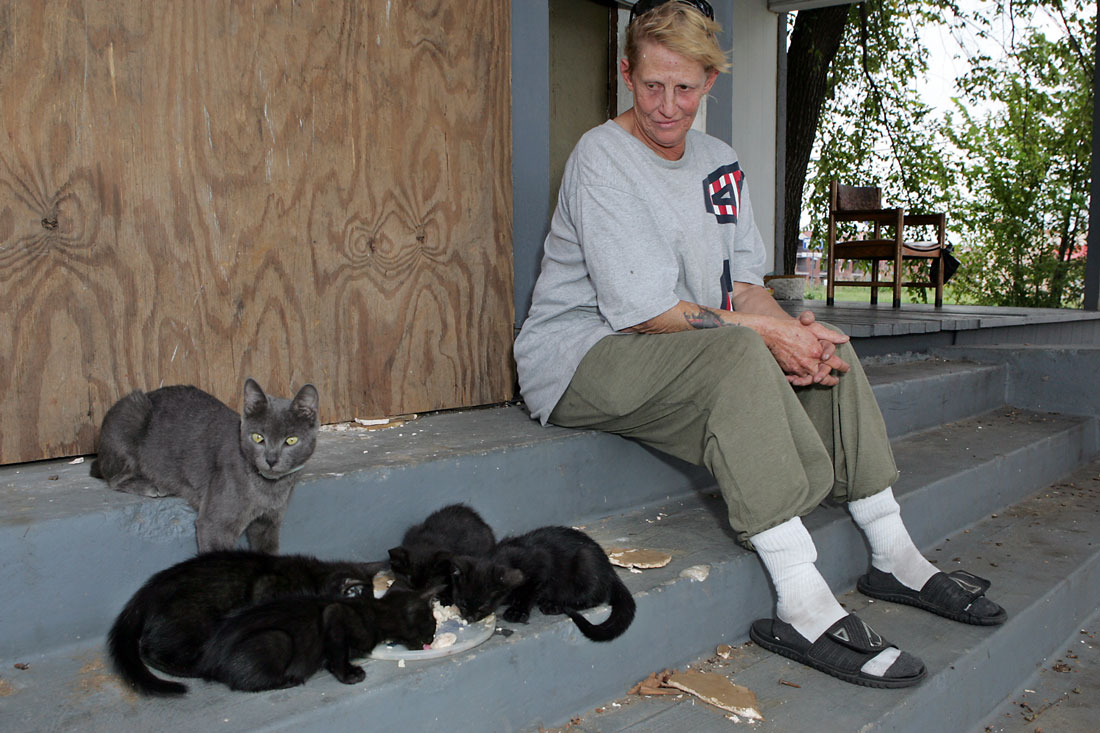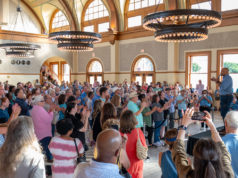The once-stately house at 1108 Grainger St. has had its bones picked by an architectural salvage team, and most of its windows are boarded up. At the peak of the roof, the center gable windows are two gaping holes, open to the breeze.
Felix Schleenvoigt sold the house to QuikTrip Corporation in September. A new gas station is planned for the site. There’s no word on when the old house will be demolished. And Lorraine Young has no idea when she will leave — or how, or where she’ll go.
Built in 1920, the house was subdivided at some point into apartments. It sits incongruously now, on the corner of Grainger and West Rosedale streets, one of the last houses remaining among retailers like Family Dollar and Cash America Pawn.
Young, 59, sits out on the front porch most days. She believes her former landlord should use part of his profits from the sale to help her move.
She cares for a gray mother cat and watches over five kittens that hide behind a broken wallboard. Dishes of cat food and water sit beside her old straight-backed chair. She is slender, with a shock of graying blonde hair barely showing beneath an old baseball cap. She is wearing three or four shirts under a windbreaker, and well-worn green sweatpants.
Young gets care for her chronic obstructive pulmonary disease (COPD) and arthritis from nearby John Peter Smith hospital. She’s shy about her teeth — many are missing, all are discolored. “I’m not sure anyone would give me a job with these teeth,” she said.
She isn’t supposed to be living at the old house. Schleenvoigt said that while he didn’t technically evict her, Young gave him the impression she was moving out.
“She didn’t have a lease,” Schleenvoigt said. “I was letting her live there rent-free for three or four months, after her boyfriend died. I took some of her belongings to store for her until she found a new place. I didn’t charge her for storage.” He said the utilities — gas, water, electricity — have been turned off since September.
Young tells a different story.
“Felix was not only my landlord, but I worked for him. My husband and I did light construction work for him,” she said. “I cleaned his properties after a renter would move out. I repaired plumbing, fixed leaks in the roofs. I’ve crawled under almost all of his rental properties in Fort Worth. He has 14 or 16 houses.” She showed Schleenvoigt’s apartments to potential tenants, she said, and helped out regularly. “Sometimes he would pay me, or just take some money off the rent. We never had a lease, but we were never a day late or a penny short.”
She and William Marxsen were “common-law husband and wife,” Young said, living on the $826 he received each month from Social Security. “We paid $500 a month for rent, so you do the math,” she said wryly. “We managed.”
When Marxsen died in May, Young was devastated financially and emotionally. “Tell my story,” she said. “Because this could happen to anyone.”
“She wasn’t my employee,” Schleenvoigt said from his home in Willow Park. “Well, she did some odd jobs here and there, and I would pay her a little bit — $20 or $30.” He said Young knew he had sold the house because she collected keys from other tenants as they moved out. “She gave me those keys, and she stayed a while to help keep the bums out. I know she called the police once to run off some vandals.”
Young is articulate as she makes a case for her former landlord to help her relocate: “I know for a fact that Felix got $250,000 from QuikTrip and that they said some of the money was to help relocate the tenants.
“I am disappointed because of all people, Felix shouldn’t have done me this way,” she said.
Neither Schleenvoigt nor QuikTrip would confirm the purchase price, and both parties to the sale said it included no such relocation clause.
“I have no legal obligation for her,” Schleenvoigt said, “and if she’s still there now, technically, … she’s trespassing.”
He acknowledged a six-year landlord-tenant relationship with Merxsen and Young but said Young told him she was moving out to a shelter on the day the sale closed. “You know what, she’s had a hard enough time of it, but there’s nothing I can do. I’ve closed and I got my check. I don’t think she wants to work, and she expects someone to take care of her. I guess she’ll just stay there until the bulldozers come.”
Jaime Fernandez had nothing nice to say about Schleenvoigt. “I’ve watched Felix work for many years,” he said.
Fernandez grew up in the house next door — 1112 Grainger St. — which he eventually bought from his father. That house too was split up into rental apartments, and Fernandez sold it to QuikTrip as well.
“My apartments were all vacant, because I told my renters far in advance that they needed to move,” he said. “The contract negotiations took a year-and-a-half, so that was plenty of time. My last one moved out nine months before we closed, so I didn’t have no rent for nine months, but it was the right thing to do.
Jake Barron handled the Grainger Street purchases for QuikTrip. When he heard that Young was still living in the house, he seemed genuinely surprised. “When we closed on that property, I was assured that it was vacant,” Barron said. “I’ll try to get over there and see what’s going on.”
Mike Thornbrugh, manager of government and public affairs for QuikTrip in Tulsa, said, “We try to be above-board in everything we do. It’s our policy that when we close on a piece of property, we want it to be tenant-free. Of course there are unique situations, but we try to help with those if we can as we negotiate.”
Tenant relocation is “up to the landlord or the seller,” Barron said. He followed up with Young about 12 hours after Fort Worth Weekly informed him that she was still living in the house.
“She was sitting on the porch when I got there,” he said. “I talked with her for a long time, and this is a new situation for me. I was shocked. I told her we would do what we could to help her.”
In Fort Worth, the first source of help for people on the brink of homelessness, with no family and no income, is the United Way’s 211 call center. Trained social workers help arrange emergency housing, financial assistance, legal aid, healthcare, food supplies, and senior services.
Matthew Weaver coordinates the call center for United Way. “The first question out of our mouths is, ‘Are you safe?’” he said.
After that, he said, staffers try to assess and meet clients’ other needs, including housing. “We’re partnered with Texas’ Health and Human Services Commission, and we’ve just completed an exhaustive database for community services within Tarrant County and seven contiguous counties,” Weaver said. “We can help.”
Young had never heard of the 211 call center, but she’s tried the Presbyterian Night Shelter on East Lancaster Avenue.
“I can’t go back there,” she said. “I have a luggage cart to carry my last possessions, and that’s not allowed.” She seemed upset by the number of homeless people crowding that part of Lancaster. “There were 400 or 500 men out there,” she said.
She talked about the vulnerability of others, including the stray cat and kittens. “I don’t know what will happen to these cats if I have to leave.”
North Texas freelance writer Annabelle Massey Malloy can be reached at annabellemm@sbcglobal.net.












